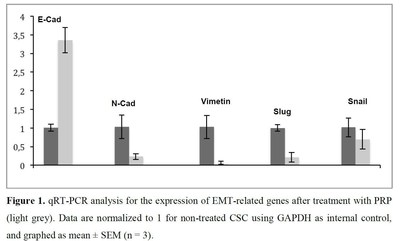Propanc Discovers PRP Dramatically Suppresses Cancer Stem Cells
Files Third Patent Citing New Treatment Method to Halt Cancer Progression
MELBOURNE, Australia, Feb. 4, 2016 /PRNewswire/ -- Propanc Health Group Corporation (OTCQB: PPCH) ("Propanc" or "the Company"), an emerging healthcare company focusing on development of new and proprietary treatments for cancer patients suffering from pancreatic, ovarian and colorectal cancers, today announced the Company has filed a third patent regarding the use of its lead product, PRP, as a method to treat cancer by targeting cancer stem cell eradication, whilst sparing normal stem cells.
Cancer stem cells (CSCs) are immortal, tumor-initiating cells that have the capacity to self-renew and differentiate into other cell types. They are found in many solid tumors and, given their stem-cell like properties, are thought to be the basis for tumor initiation, development, metastasis and recurrence.
Through the Company's research partners at the Universities of Jaén and Granada in Spain, experiments were conducted using isolated CSCs from patients, comparing the behavior of these cells pre and post treatment with PRP by examining the genetic pathways that control these cells. The results could not have been more convincing.
By using several experimental techniques such as qRT-PCR, a laboratory technique that monitors the amplification of a targeted DNA molecule in real time, they confirmed several key EMT (epithelial to mesenchymal transition) genes from CSCs are significantly down regulated. The EMT occurs when cells gain migratory and invasive properties to become stem cell like. As well as being associated with normal processes within the body, the EMT also occurs in the initiation of metastasis for cancer progression.

Photo - https://photos.prnewswire.com/prnh/20160203/329579-INFO
Additional experiments using PCR arrays showed that EMT suppression occurs through three important pathways linked by an important marker, transforming growth factor beta (TGF-β), which plays a pivotal role in a number of cancers and the metastasis invasion cascade. By normalizing these pathways, it appears to halt the proliferation of CSCs significantly.
"After conducting these experiments, I conclude that PRP is quite dramatically suppressing the metastatic potential of CSCs by regulating the EMT process. This is quite relevant, because in CSCs, the EMT machinery is working very hard to maintain their metastatic potential compared with 'normal' cancer cells," said Dr Macarena Perán, Lecturer and Laboratory Manager, at the University of Jaén. "Furthermore, the EMT seems to be suppressed via several different ways. Any one of these facts, per se, will be enough to justify developing a new compound, and we have identified three pathways, so the results are very encouraging."
"Back in the early stages of our Company when I first administered proenzymes, extending the lives of some of my terminally ill patients in my clinical practice, I instinctively knew we were onto something important, but it has only been recent advances in understanding relatively new concepts in immunobiology and how they relate to cancer, have we uncovered the multiple mechanisms of proenzymes and their anti-cancer effects," said Dr Julian Kenyon, Propanc's Chief Scientific Officer. "This significant step forward in our scientific understanding will provide a great deal of confidence as we look towards initiating patient trials later this year."
CSCs represent only a small fraction of the cancer cells within a tumor and can remain dormant for extended periods of time, thereby evading conventional therapies (e.g., chemotherapy and radiotherapy) that are targeted to highly proliferative cells. Consequently, a priority for improving cancer treatment and reducing the risk of cancer relapse is to develop new strategies that selectively target CSC eradication whilst sparing normal stem cells.
"I am delighted with the results achieved through our research partners, and look forward to further elucidating the molecular target by which the proenzymes exert their effects. Not only have we now shown that PRP halts a fundamental mechanism by which cancer grows and spreads in order to reduce the risk of relapse, but we can now turn our attention towards developing new compounds which further enhance these clinical effects," said James Nathanielsz, Propanc's Chief Executive Officer. "As a result of this hard work and persistence, we have been able to identify a third invention in the field, which strengthens our intellectual property portfolio and increases the value of our Company. I look forward to continuing our close collaboration with the Universities of Granada and Jaén, who are world class in the immuno-oncology field and cell regenerative medicine."
About Propanc:
Propanc is currently focused on developing new cancer treatments for patients suffering from pancreatic and colorectal cancers. We have developed a formulation of anti-cancer compounds which exert a number of effects designed to control or prevent tumors from recurring and spreading throughout the body. Our products involve or employ proenzymes, which are inactive precursors of enzymes.
In the near term, we intend to target patients with limited remaining therapeutic options for the treatment of solid tumors such as colorectal or pancreatic tumors. In future, we intend to develop our lead product to treat (i) early stage cancer and (ii) pre-cancerous diseases and (iii) as a preventative measure for patients at risk of developing cancer based on genetic screening. For more information, visit: www.propanc.com.
Forward-looking Statements:
Certain of the matters discussed in this announcement involve risks and uncertainties including, without limitation, those regarding the Company's ability to establish and maintain the proprietary nature of its technology through the patent process, its ability to license from others patents and patent applications, if necessary, to develop certain products, its ability to implement its long range business plan for various applications of its technology, and its ability to enter into agreements with any necessary marketing and/or distribution partners for purposes of commercialization. This is not a solicitation to buy or sell securities and does not purport to be an analysis of the company's financial position. See Propanc's most recent Quarterly Report on Form 10-Q and related 8K filings.
To view the original version on PR Newswire, visit:http://www.prnewswire.com/news-releases/propanc-discovers-prp-dramatically-suppresses-cancer-stem-cells-300215177.html
SOURCE Propanc Health Group Corporation
Released February 4, 2016
